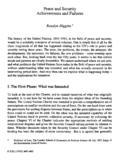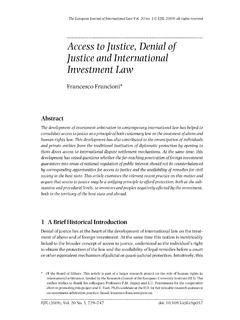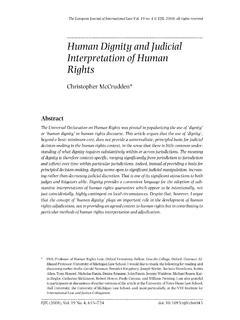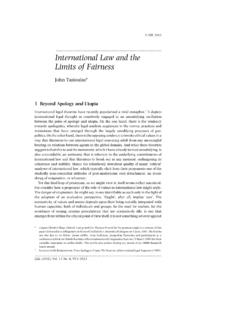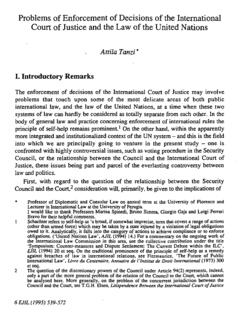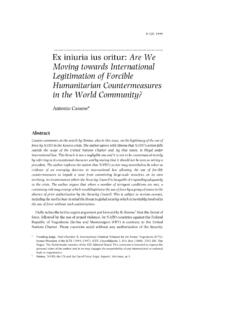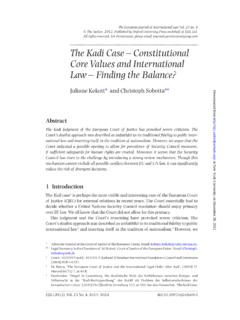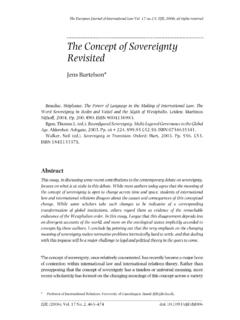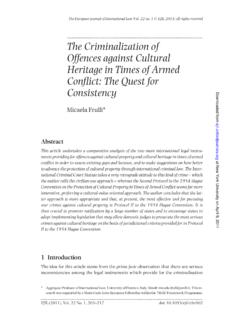Transcription of Tom Franck’s Fairness - European Journal of ...
1 EJIL 2002*Reader in International Law, University of Glasgow. Thanks to my colleague, Catriona Drew, forcommenting on this article when she had little time to do so as she should have been working on her PhDdissertation, and to Tom franck himself for the comments he made at the Glasgow colloquium. As thiswas finished on my nephew Alastair s 17th birthday, I should name-check him M. franck , Fairness in International Law and Institutions(1995), at 6 [hereinafter Fairness ].2 This is indeed the tenor of franck s earlier monograph The Power of Legitimacy among Nations(1990)[hereinafter Legitimacy], see esp. Ch. , at (2002), Vol. 13 No. 4, 909 franck s FairnessIain Scobbie*The ambit of this paper is both modest and circumscribed. Circumscribed in that itsfunction is to provide an overview of the structural qualities of Tom franck s fairnessthesis expounded, principally, in Fairness in International Law and Institutions(1995).
2 Modest in that its main aim is exposition, whilst giving some indication of theintellectual tradition upon which franck builds. Critical analysis, particularly ofspecific examples or illustrations franck employs, is a secondary consideration, giventhe other contributions to this Tom franck s Fairness Thesis An ExpositionFranck starts from the premise that public international law is now a mature legalsystem that has entered what he terms its post-ontological era .1 This means thatinternational lawyers need no longer argue about whether international law is or isnot really existence and reality of the discipline is now established, but:With new opportunities come new challenges! The questions to which the internationallawyer must now be prepared to respond, in this post-ontological era, are different from thetraditional inquiry: whether international law is law.
3 Instead, we are now asked: isinternational law effective? Is it enforceable? Is it understood? And, the most importantquestion: Is international law fair?3 franck sees this as a development starting in the late 20th century, arising from thegrowth in the number and functions of international organizations and from910 EJIL 13 (2002), 909 9254 Ibid: a similar sociological claim lies at the heart of franck s latest monograph, The Empowered Self: Lawand Society in the Age of Individualism(1999) [hereinafter The Empowered Self].5 See Fairness , at 22 , at ibid, at 146 et seq, and also Stephen Tierney s contribution to this symposium, 13 EJIL(2002) , at , at in science and technology. As a consequence, new areas of potentialinter-state conflict have emerged that require franck Fairness , or at least Fairness insofar as it is relevant to publicinternational law, has two vectors; the requirement of legitimacy and that ofdistributive justice.
4 Legitimacy is fundamentally a question of procedure therequirement that proper mechanisms are in place to ensure the creation, interpret-ation and application of the law. Distributive justice is concerned, on the other hand,with the substantive worth of rules: is an appropriate or proper allocation of burdensand benefits secured throughout society by the rules themselves? franck sees thesetwo factors as having different functions legitimacy is concerned with order whilejustice deals with change. The two are independent in their operation: claims andarguments in favour of order within the international legal system can conflict withclaims and arguments in favour of change. There is always the potential for conflictbetween these two vectors as they encapsulate different aspects of Fairness : legitimacyexamines process Fairness and distributive justice moral claim advancedfrom one of these perspectives can conflict with a claim advanced from another Fairness is the rubric under which this tension is discursively managed.
5 6An exampleoffered by franck is that of the tension between uti possidetisand self-determination indetermining title to discourse, for franck , is accordingly the method by which the tensionbetween order and change can be negotiated societally, by taking account of bothfactors: Fairness is relative and subjective .. a human, subjective, contingent quality which merelycaptures in one word a process of discourse, reasoning, and negotiation leading, if successful, toan agreed formula located at a conceptual intersection between various plausible formulas fair legal system must manage both these elements of order and change, oflegitimacy and distributive justice, because people judge the validity of a legal systemin terms of its consequences. As franck says:[People] expect that decisions about distributive and other entitlements will be made by thoseduly authorised, in accordance with procedures which protect against corrupt, arbitrary, oridiosyncratic decision-making or decision-executing.
6 The Fairness of international law, as ofany other legal system, will be judged, first by the degree to which the rules satisfy theparticipants expectations of justifiable distribution of costs and benefits, and secondly by theextent to which the rules are made and applied in accordance with what the participantsperceive as right franck s Fairness91110 See ibid, at 9 et , at , at 10 ibid, at 11 13, and also Dino Kritsiotis contribution to this symposium, 13 EJIL(2002) , at both substance and procedure are equally important, but at this point it shouldbe stressed that franck sees the process value of legitimacy as encompassing both thecreation and application of rules. These transactions must be both principled and notarbitrary. This is one of the core propositions of franck s from the relative maturity of the legal system, franck argues that there aretwo preconditions that must be present before Fairness discourse can take place at claims that both currently exist in international relations.
7 These preconditions arethat there must be a moderate scarcity of the good(s) to be distributed, and thatdistributive Fairness can only be discussed when there is a sense of communitycharacterizing the moderate scarcity franck means that the good(s) to be distributed must not be insuch an abundant supply that no contentious questions regarding their allocationcan arise. Fairness is only an issue when there is not enough of a given good to satisfyeveryone completely, and that good must be shared out:When everyone can expect to have a share, but no one can expect to have all that is desired, thecritical moment for considerations of Fairness is met. It is only then that modes of allocation donot contend in the arena of the zero-sum game, one that pits the survival of each against thesurvival of the other hand, allocation can only happen within a community: there must besome subsisting social structure within which distribution makes sense as this cannothappen in a social vacuum.
8 By community, franck means a social system thatassumes some continuity and structured relationship between the actors which isbased on shared values and reciprocity on the implicit promise to treat like as :The element of reciprocity which underpins the emergence of community is not solelyconcerned with rights and rules, it is also about shared moral imperatives and values. Toappreciate this aspect of the reciprocal nature of a community, it is necessary to understandthat its members share a system not only of legal but also of moral obligations. The laws in acommunity thus evince not only the generally held belief that each must do what he or she islegally required to do, but also that each will discharge towards all others those obligationsarising from the shared moral is of the opinion that interdependence between actors on the internationalplane has now reached a degree that one can argue that there is at least an emergingsense of international community in this material, as opposed to a rhetorical, he explains on the basis of social contract theory.
9 It is self-evident that contractarian theory readily explains the origins, if not the modernnature, of international law and 13 (2002), 909 92515 Ibid, at , at ibid, at 14 et seqand, for a searching critique of this aspect of franck s thesis, John Tasioulas contribution to this symposium, 13 EJIL(2002) Fairness , at 16 ibid, at 18 , at , at , at ibid, at 47 et this claim undoubtedly has a degree of plausibility, it is worth consideringwhether the growth in both the number and functions of international organizationshas undermined the pertinence of franck s contractarian assumption, especially as heidentifies this exponential expansion 15as one of the factors that has brought thequestion of the Fairness of international law to the further argues that Fairness is a contingent social structure as it ishistorically and culturally grounded Fairness is not out there waiting to bediscovered, it is a product of social context and history 16 but there are parameterswhich must exist for Fairness dialogue to be viable.
10 franck terms these thegatekeepers of Fairness discourse 17and identifies them as:1. no trumping: there can be no non-negotiable claims advanced by the participantsin Fairness discourse;18and2. maximin: inequalities are only justifiable if inequality has advantages not only forthose who benefit from that inequality but for everyone function of these gatekeeper principles is, at one level, to act as evidence of theexistence of a community based on reciprocity, but they also provide a shared core ofassumptions that circumscribes the ambit of otherwise unlimited choice :If there is no such core, if there is no agreement on any basic assumptions to govern discourse,if nothing is excluded, nothing off the table by reference to shared basic assumptions, thenthere can be little hope of real gatekeeper principles thus delineate the broad contours of the substantive(distributive justice) aspects of Fairness .
